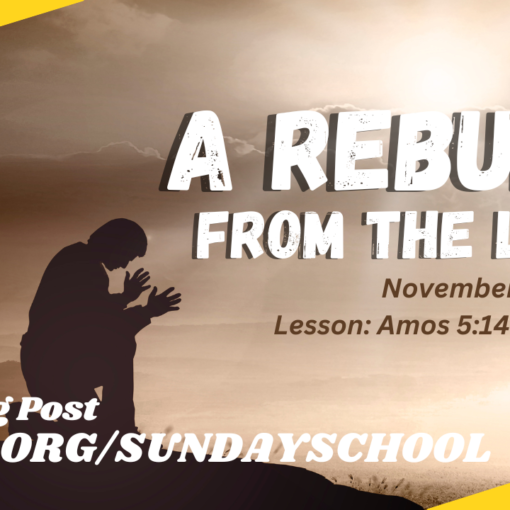Scripture
By Doug Smith
Lesson Text: Ruth 2, 8:18
When we first meet Ruth , she is a destitute widow. We follow her as she joins God’s people, gleans in the grain fields, and risk her honor at the threshing floor of Boaz. The story of Ruth takes place sometime during the period of the Judges.( 1160 BC and 1100 BC). These were dark days for Israel, because of the apostasy and immorality which in turn caused great suffering,
Ruth made her home in a foreign land. Instead of depending on Naomi or waiting for good fortune to happen, she took the initiative. She was not afraid of admitting her need or working hard to supply it. When Ruth went out to the fields, God provided for her. As Boaz noticed her hard work, he gladly welcomed Ruth because she had gained a reputation for showing kindness and generosity to others.
Boaz went far beyond the intent of the gleaners law In demonstrating his kindness and generosity. Not only did he let Ruth glean in his field, he also told his workers to let some of the grain fall on purpose in her path. Out of his generosity he provided an abundance of grain more than they ever imagined. God’s demonstration of His love for Ruth, showed His care for Ruth, someone outside of Israel.
Related Scriptures
By Charlene Armstrong
Related Scriptures: Ruth 2:1-7; Leviticus 19: 9-10; Deuteronomy 24: 19-22; I Timothy 6: 17-19
Ruth 2: 1-7 begins with the presence of a man named Boaz, who is of the same family as Naomi’s husband. While at home Ruth ask for Naomi’s permission to glean barley behind the harvesters. Word had circulated around town, that Ruth had joined Naomi, and Boaz realizes she is the Moabite woman who left her country, people, and gods.Leviticus 19: 9-10, commanded farmers in Israel that they should not completely harvest their fields and “ cut” corners in harvesting, leaving some behind. Also if they happened to drop a bundle of grain, they were to leave it on the ground and not pick it up.
Deuteronomy 24: 19-22, explains the act of gleaning can be seen as a symbol of God’s provision and care. We see the care of not taking everything for oneself, but rather leaving room for the needs of others to be met. These verses provides a powerful message about compassion, for those in need as well as remembering one’s own history of oppression. We see an act of faith and trusting God’s provision.
In I Timothy 6: 17-19, Paul reminds Timothy to tell the wealthy to remember where the wealth came from. They were to keep their lives God centered, so that they would recognize how God had given them wealth. They were reminded not to be overly proud or arrogant. Those who became obsessed with wealth open themselves to virtually any other sin one can imagine.
Practical Points
By Brittenne Boykin
The godly person does what he can to help the poor and needy.
This week’s text is a great reminder of how true followers of Christ heed the call to help the poor as part of our daily practices. The story of Boaz and Ruth shows us that kindness is part of who we are as believers and how we conduct ourselves with those we interact with during our day to day activities, no matter what they are. Boaz showed generosity because it was not just the right thing to do but because it was what pleased God. We will all have to give account for how we have cared for those that can offer us nothing in return. This week let’s take a moment to notice where God is calling us to be more like him in the areas of kindness and generosity.
God blesses us and others through our diligent work.
God had blessed Ruth with an open door of generosity and do what God had given her the opportunity to do. After Ruth had worked all day gleaning she returned to her mother in law Naomi and showed her what she had gleaned. Ruth showed generosity even as God had blessed her by even giving Naomi the food she had leftover after she had been satisfied. In a world where doing the least and consuming the most has become the norm, let us be diligent with what God has given us and where He has placed us that we may prosper. When we are blessed let us be mindful not to over consume so that we can bless others with even our excess.




